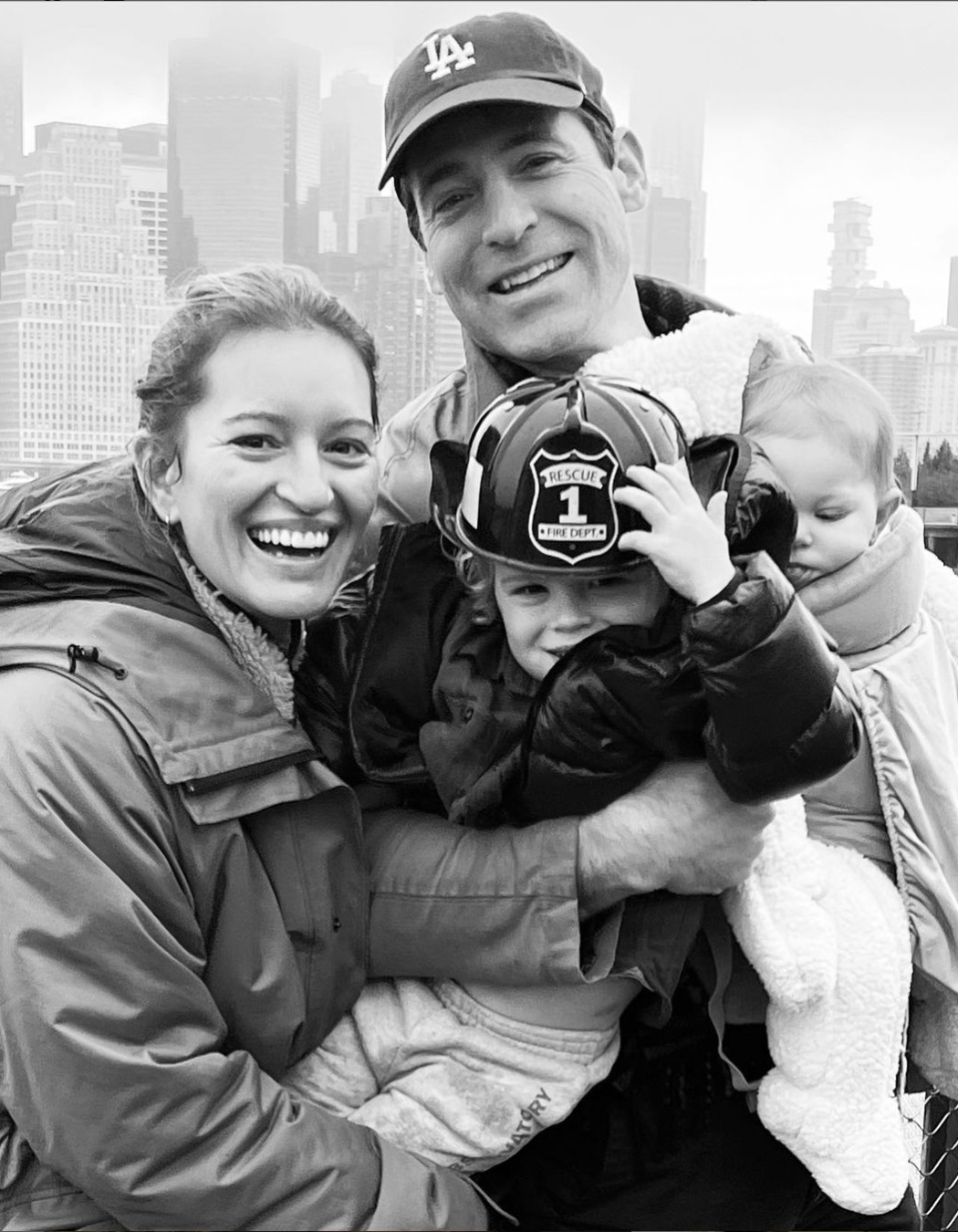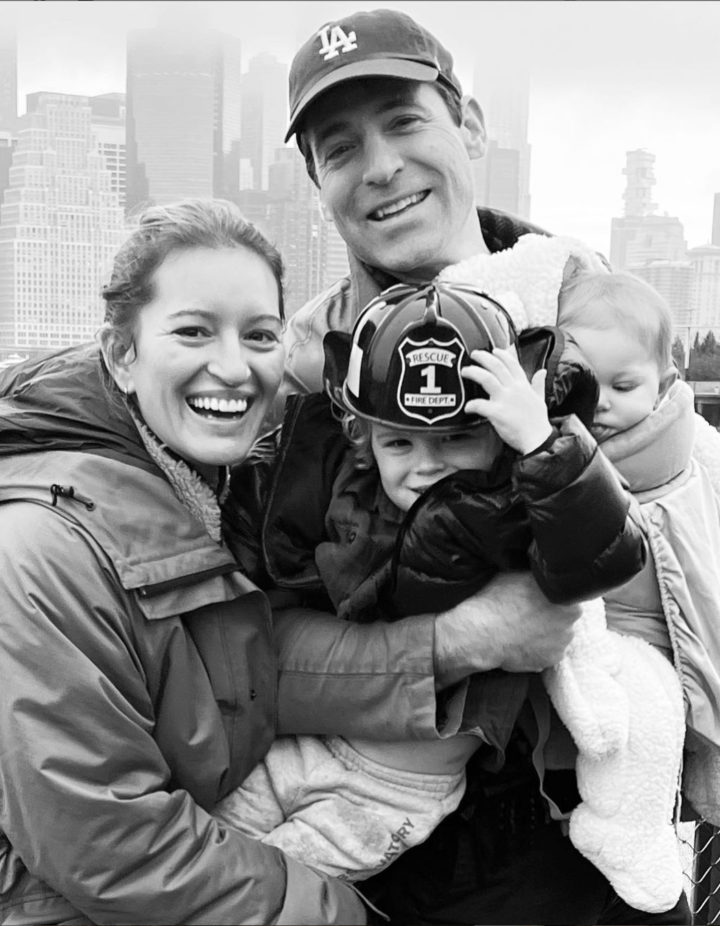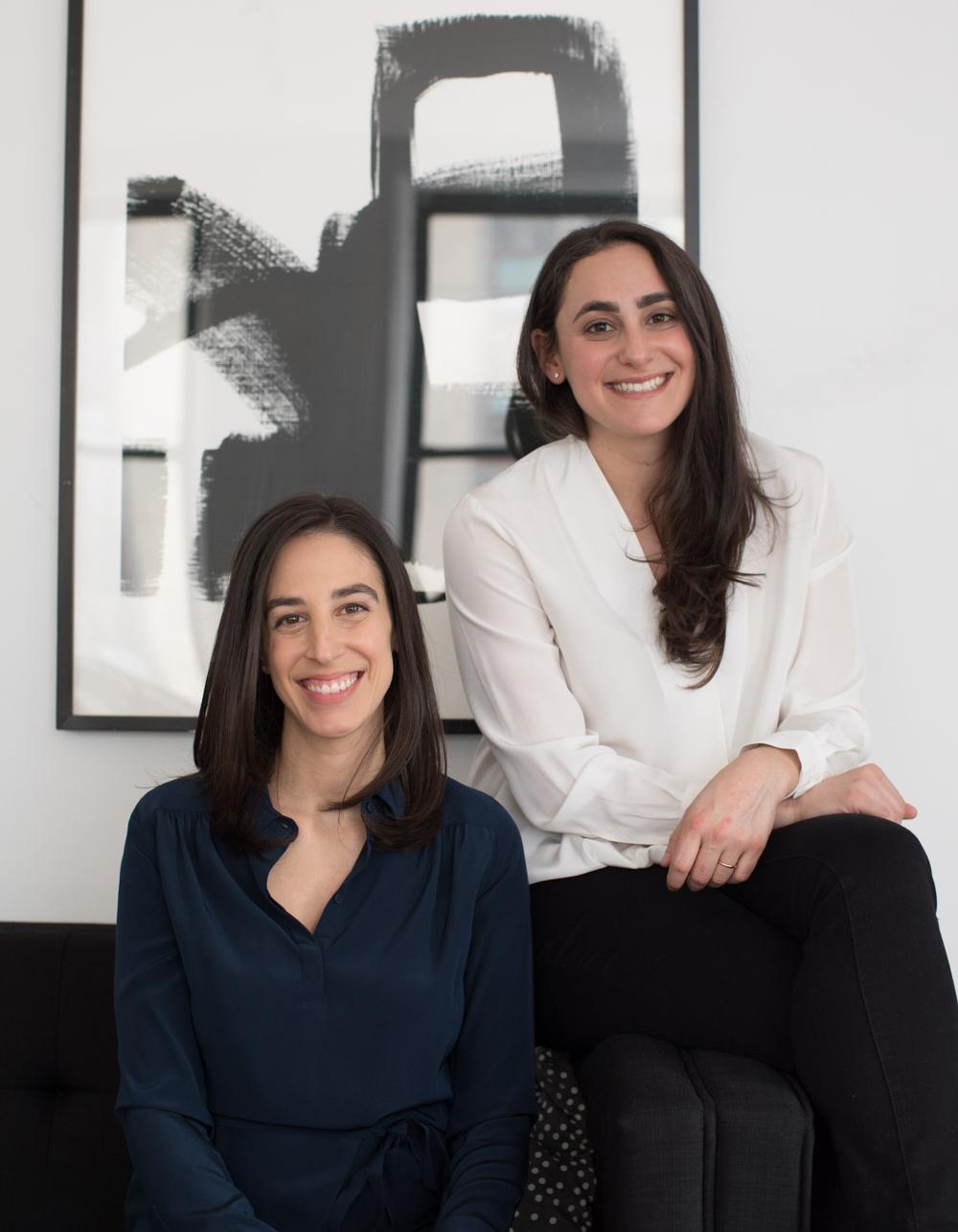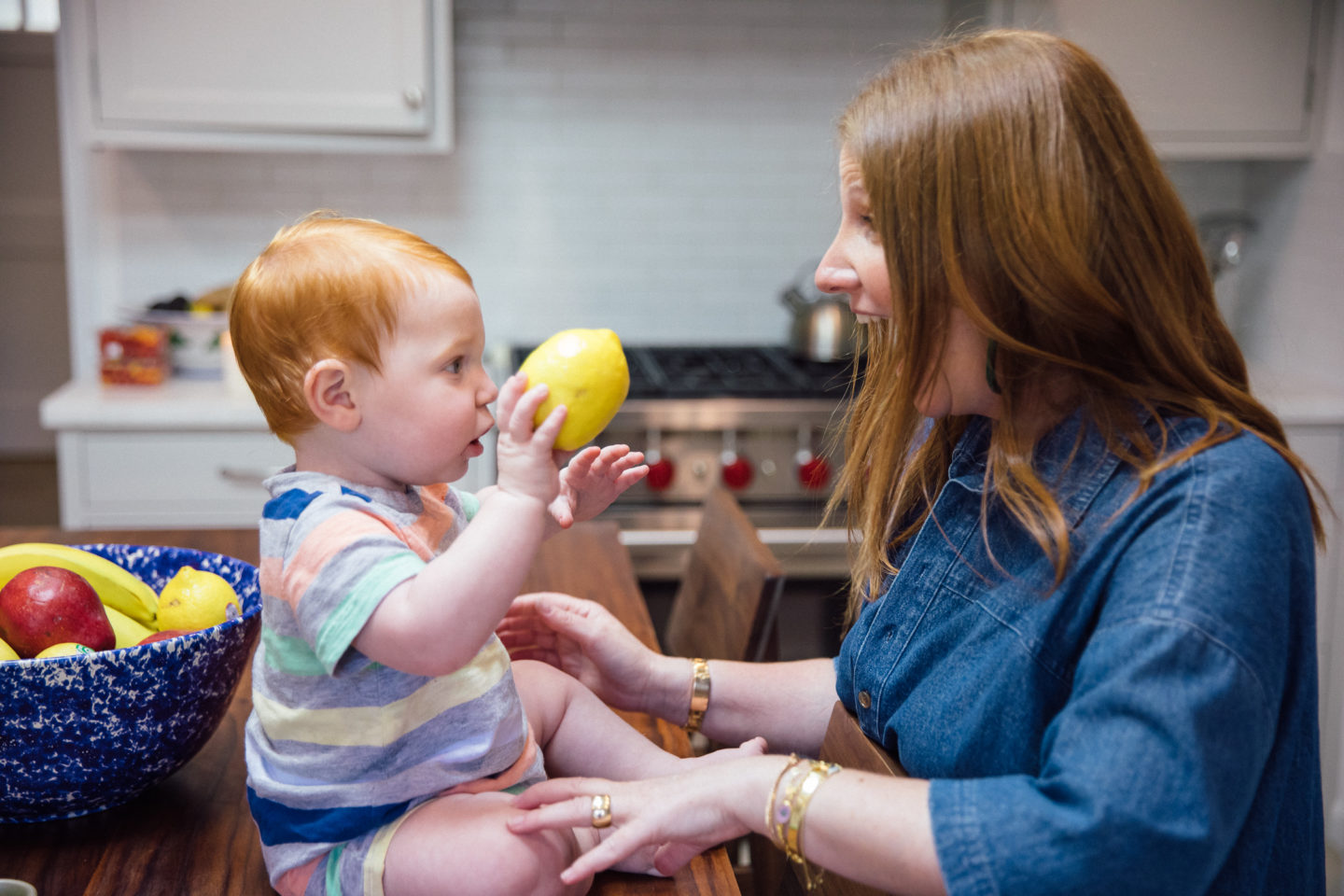Katy Tur has had a wild ride.
No, we’re not referring to her post covering the Trump campaign that inspired her first book, Unbelievable, followed by gaining a solo show on MSNBC, Katy Tur Reports, followed by giving birth to two kids back-to-back with husband and fellow broadcast journalist, Tony Dokoupil.
Nope, we’re talking about the chopper she grew up on with her parents, a pair of helicopter journalism pioneers who offered young Katy a birds-eye view into news-breaking stories from 20,000 feet as well as an unorthodox, at times frightful home life – all of which Katy documents in her latest book, Rough Draft.
Now, as Katy comes off her postpartum pandemic life and settles into a family groove that’s very much grounded (in a cozy Brooklyn brownstone, no less), she’s catching her breath for the first time in five years. We caught up with this spirited reporter fresh off the January 6 hearings to talk through babes, birth, and her next chapter.
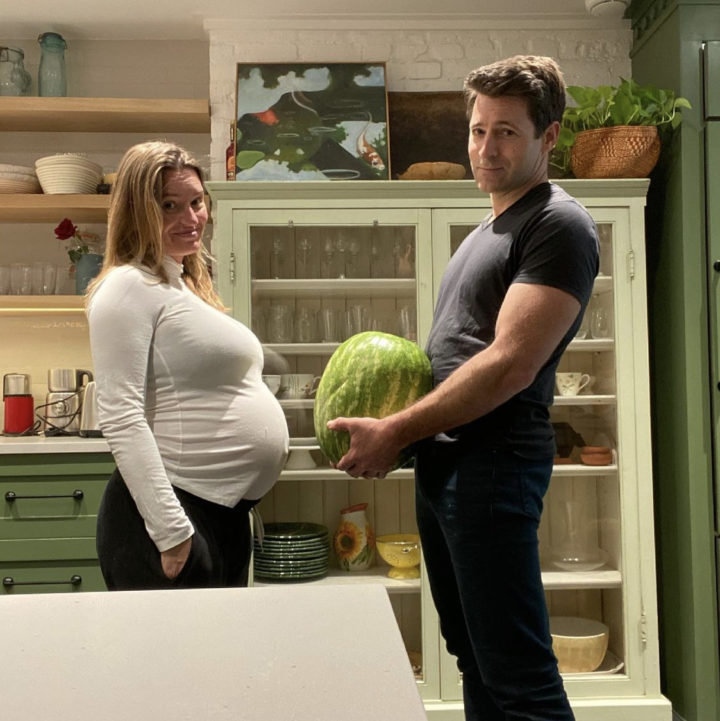
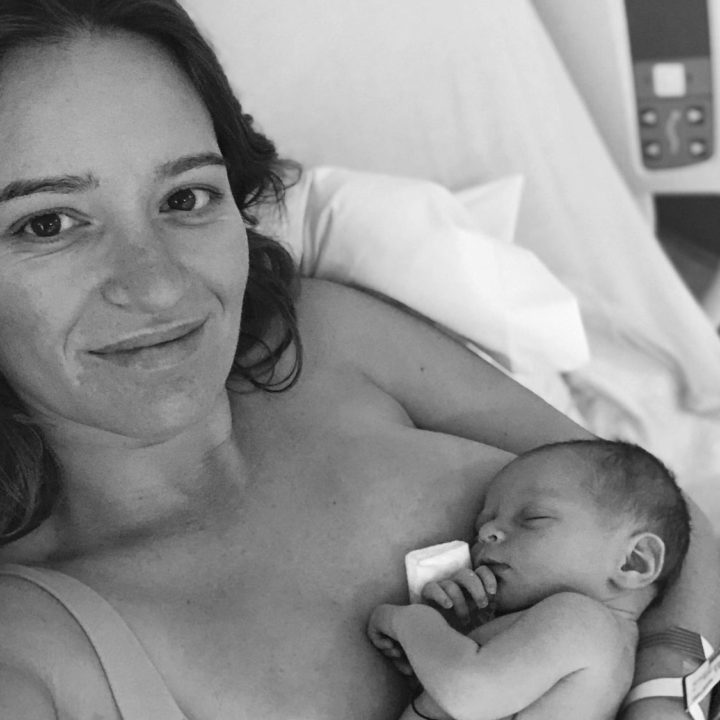
You’re a little over one year out from having your second child. How’s life going with two? What feels different for you?
Oh my gosh, I thought my life changed after the first baby. I thought it was the hardest thing I could have ever done. And then I had the second baby and I realized that having one is a cakewalk. You could have zone defense, you pass the baby around. Now it’s man-on-man. So in my house, there’s never any rest. Somebody’s always taking care of one of the kids. We also have two older kids. So the house over the summer gets really wild. It’s total madness. You know, I’m alive, I’m breathing, my little Eloise is walking and babbling and it’s just wonderful. I’m obsessed with her.
How was your postpartum experience different from one child to the next?
With Teddy, I was in a state of shock because I had an emergency c-section. I just wasn’t expecting it, and I had no preparation for what the recovery would be like. It happened so fast that I found it difficult to walk downstairs, let alone sit up and nurse, which was a whole other battle. I bonded with Teddy immediately, but I also didn’t. I hated the infant stage, I felt like I didn’t want to be holding the baby all the time. Because whenever I was holding Teddy, he wanted to nurse, and I just got really stressed out by it.
With Eloise, I had a better birth experience. I recovered much faster. I had a great surgeon who sewed me up really nicely. And I found the recovery was just a world better than the first experience. But I also had a hard time in the first few months because, again, this completely helpless infant just screams all the time. And she spit up everytime she ate. I was literally covered in vomit for the first eight months of her life.
I hated the infant stage, I felt like I didn’t want to be holding the baby all the time.
I’m good with babies once they get to four months, and they start smiling and laughing, and then I’m like, oh, I can handle you. Of course you’re never supposed to say that. You can only say it’s amazing and wonderful. And that you feel completely blessed.
That’s something we’re always trying to dismantle at Babe. It’s not always “magical and amazing.”
I felt like a farm animal.
How was your maternity leave?
I am very lucky because NBC gives you four months paid, plus I took a month of vacation time. So that got me to five months. And then I just took another month off because they can give you up to six months. It was really beneficial to my mental health and it was really beneficial to my physical health. It was great for bonding between me and Eloise, but also bonding between Eloise, Teddy and the older kids who were here for the whole summer. It gave us the time we needed to establish ourselves as a family unit before I went back to work. I think it’s really just completely necessary and it’s appalling that I am one of the very, very lucky people out there.
Speaking of, it’s such a dark time for women and moms, and women who don’t want to be moms, and children. The list goes on. As a reporter, how do you stay sane day after day? How do you find the light?
I won’t lie to you, it’s really hard because we have been covering some pretty dark stuff now for a while. The political divisions scare me when I think about the country that I’m handing over to my kids. The war in Ukraine has some terrible news coming out and terrible imagery to view, the shooting in Uvalde was really painful as a mother to report on. And it’s scary to know that there might be a quick fix and a simple solution to it, but in the world that we live in – in our country it’s not that simple. And you know, Roe v. Wade, the thing that’s striking me about that decision more than anything else is that this is a government that is now forcing a woman to have a baby. And that same government is offering no supplement, no help. There’s no system in place. There’s no foundation for the woman and the baby in the family to thrive. There’s no paid parental leave, no universal health care. Subsidized baby formula has an asterisk around it. Here’s what you can use, and here’s what you can’t use.
It’s very expensive and very emotionally draining to have a child. And that’s when you want one, when you really want one, when your whole being is centered around having that kid. I hate to imagine what it must be like for somebody who’s not ready or doesn’t want a child. So how do I deal with it? I go home and I play with my kids. And I hope that we can make it better for them. I hope that more people get involved and try to work within the system that we have. It’s not a perfect one. Also, there are eighty million eligible voters who don’t participate. I think about ways to try and get to them. And it’s cheesy, but I just hope that if we fail, maybe they’ll do a better job when they get older.
Now that you have a daughter, does this feel particularly resonant?
It’s scary, knowing that our decisions in life will now have to take into account what decisions she’s allowed to make. Where’s she going to go to college? Is that a place that will allow her to make a decision for herself? Where will she go to work? Is that a place that will allow her to make a decision for herself? I mean, that’s now. But we could come into a situation where she has no choice anywhere in this country or something might change and she’s got a choice.
The variables of it are what is scary because I want her to thrive. Not just my daughter, it’s my son, too. I know we talk about this as a woman’s issue, and it is happening to a woman’s body, but it is very clear that it’s affecting a lot of men as well. And there are a lot of men out there who don’t want to start a family and they’re going to be forced to start a family. I think it’s an issue for all of us.
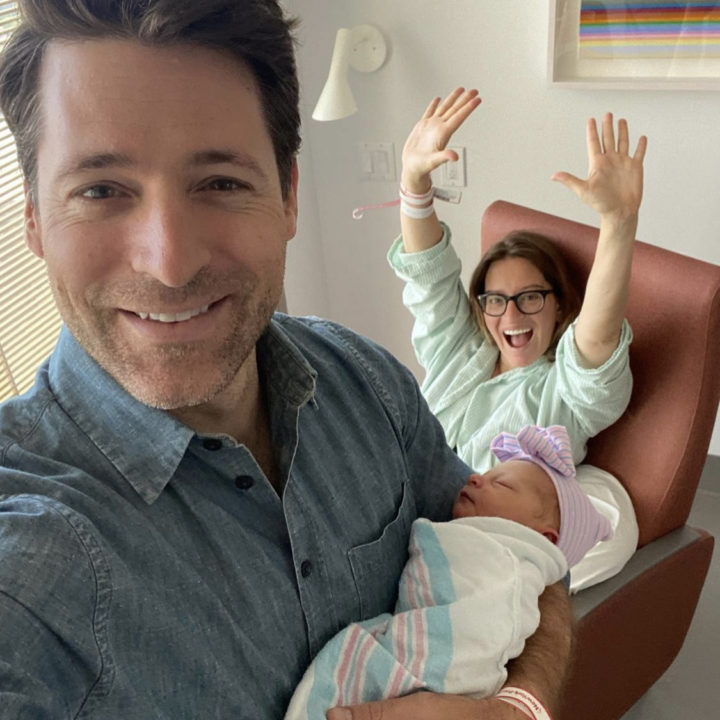
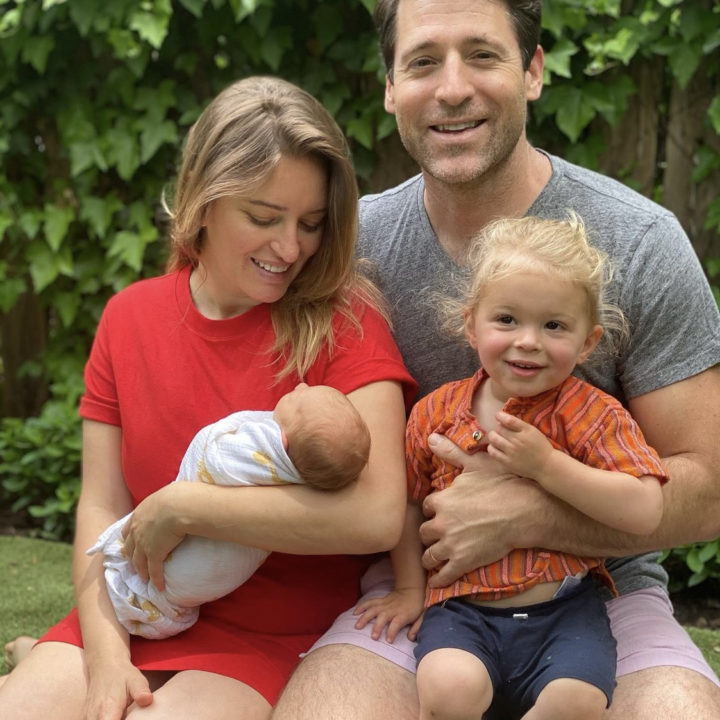
You write in Rough Draft about about your parents and their role as journalists, and about your relationship with your father. I wonder how your childhood has informed your own parenting.
You know, we can’t choose our childhoods. We can’t choose the lessons of our childhood, but we can all choose what to take with us. And when I look back at the way I grew up, I am holding on to all of the fun and the adventure, the love for learning, the curiosity that my parents had about the world around them.
My parents were journalists, and they wanted to be in the middle of the action. They wanted to be telling you what you needed to know about big, breaking news events. I mean, I grew up in a helicopter. I spent more time in a helicopter than I did in my own bed. There were car seats in the helicopter. And so when I raise my kids, I want them to love finding out new things. I want them to see the world as a place that’s full of opportunity and full of interesting people and places. They have a set of parents who are learning about these things everyday. And we’re bringing that home and we’re telling them those stories are we’re taking them with us when we can.
I want to also look back on the things that were not so great about my childhood, the stuff that I don’t want to carry on with me – the stuff that I want to choose to leave behind. The great thing about writing a book is that I’m holding myself to that standard. You know, I put it all out there – all the ugly warts and all the truths. I’ve said publicly, here’s the stuff that I don’t want to take with me. Now, I have to live up to the standards that I’ve held up for myself. I’m happy about that. There’s no escape.
I’m curious, logistically speaking, how you parent. Like how you and Tony manage these full-on, high profile careers. How do you guys keep it all together?
We have really great mothers. Our mother-in-laws are here a lot. Tony’s mother lives in West Virginia. If we get into a bind, we’ll call her up. If we get into a really big bind, we will fly in my mom. We also have full time childcare, which is good because our schedules can be so variable. Tony leaves at like 4:45 am every morning, and then I leave at around 10 am. So we need somebody who’s going to be there. And then there are times where I’m traveling. So if I’m traveling and he’s leaving at 4:45 am, we’ve got to find somebody to fill in the gap. So it’s a mix of full-time childcare, mothers, and then when it really hits the fan, I leave a little bit late for work, and Tony probably will come home a little bit earlier. We keep it together with a network of solutions.
What are you doing between 6 am and 10 am?
Oh, it’s really fun. I run a diner and a laundromat. I also run a daycare and I do the editorial for a national news broadcast. So I’ve got my morning four jobs – the diner, the laundromat, the daycare and the anchoring of a news show between the hours of 6 am and 10 am every single day.
You’ve had so much happen to you over the last few years. You were given this daytime afternoon show, you got married and had kids. Do you feel like the dust has settled at all?
Tony and I talk about this a lot. We feel like we’re constantly in a state of building. It’s rush rush rush get this done, do this, do that. We both come from a home that was financially stable and then suddenly it wasn’t at all stable and that scares the two of us. So we’re trying to find a way to make sure that when the kids get to college, that college is paid for. And as anyone knows who was looking at the price of college, it’s a real hustle.
What do you do to not feel like a parent for five minutes?
I go to Phish shows. I love getting lost in the music. It’s the only place in the world where I feel like I can surrender to the flow and not even wonder what time it is or what I should be doing or what’s waiting for me at home. If I don’t have a Phish show to go to, I go into my car for alternate side parking and I play Phish on SiriusXM Satellite Radio.
What’s next for you?
What’s next is a vacation, hopefully. After that, I keep saying I’ll never write a book again. And if I ever start talking about writing a book again, somebody please slap me across the face. I don’t know, I’m already thinking maybe there’s something else I could start working on. I’d love to work on some creative adventure with my husband, because we have a lot of fun together, whether that’s a book or a podcast, or who knows what. We’re eyeing that, that’s our future.
